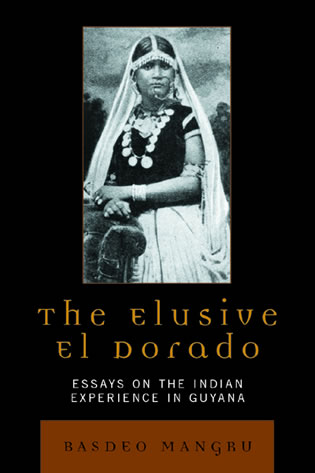Mangru, Basdeo. The Elusive El Dorado. Essays on the Indian Experience in Guyana. The University Press of America, 2005. 152 pages, $20.
This thoroughly researched book is a collection of eight essays, published and unpublished, examining issues in the indenture and post-indenture period which are relatively unexplored in the existing literature on the Indian diaspora in the Caribbean. From an analysis of the failure of a private immigration scheme from the Bombay Presidency and the disparity in emigration from Madras and Calcutta, the book examines the Hook-swinging ritual and the efforts of Christian Missionaries and officials to suppress it. The alarming incidence of Indian wife murders, particularly the causes, and the various efforts to minimize the crime and deflect criticism is analyzed in another essay. The book goes on to evaluate the pressures exerted by the sugar planters and the Colonial Office to abolish the return passage entitlement which was an indispensable part of the immigrant’s contract. Another essay provides an historical background to the sensitive race issue in Guyana, to broaden debate and foster a better understanding of its origin and development. Of the last two essays, one highlights the activities of Bechu, a fearless Bengali immigrant who launched a vigorous and sustained attack on the iniquities of the indenture system. The criticism so rattled the planting interests that they took unprecedented measures to silence him. The other focuses on the Impressions of C.F. Andrews, an apostle of Mohandas Gandhi, who visited Guyana in 1929. His report not only bemoaned the pitiable plight of Indians but also offered invaluable suggestions for improvement. It was the visit of Andrews and others which spurred Indian nationalist consciousness, enabling educated Indians to articulate their concerns with much more vigor. This fascinating book includes a list of immigrant ships, with dates of arrival, that landed in Guyana from both Calcutta and Madras. Indians interested in researching their roots will find this information invaluable. It is also a valuable resource for genealogists. Guyanese experts have made positive comments on the book. For information, contact
[Editor's Note: Mr. Basdeo Mangru is one of the most recognizable of Guyanese historians today. A local of Leguan, Essequibo, Guyana, he is a graduate of the University of London’s School of Oriental and African Studies who once taught at the University of Guyana. He currently teaches history at City University of New York (CUNY)’s York College and Social Studies at John Adams High in New York City. Mr. Mangru is also the author of Benevolent Neutrality: Indian Government Policy and Labour Migration to British Guyana, 1854-1884 (London, 1987), Indenture and Abolition: Sacrifice and Survival on the Guyanese Sugar Plantations (Toronto, 1993), and A History of East Indian Resistance on the Guyana Sugar Estates, 1869-1948 (New York, 1996).] |
| February 13th, 2006 |
©
2001 Guyanaundersiege.com |
 The
University Press of America, which specializes in scholarly and
academic works in the humanities and social sciences, has just
published The Elusive El Dorado.
Essays on the Indian Experience in Guyana. This is the fifth book
of Dr. Basdeo Mangru, Associate Professor of History at York College,
City University of New York.
The
University Press of America, which specializes in scholarly and
academic works in the humanities and social sciences, has just
published The Elusive El Dorado.
Essays on the Indian Experience in Guyana. This is the fifth book
of Dr. Basdeo Mangru, Associate Professor of History at York College,
City University of New York.